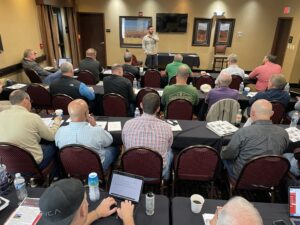
RICHMOND, Va. (BP)–First-century evangelists had a short life expectancy –- and no shortage of enemies.
“Endure hardship, do the work of an evangelist,” the Apostle Paul wrote in a letter to his young disciple Timothy, boiling the missionary task down to its rugged essence (2 Timothy 4:5). Threats, persecution, beatings and probable martyrdom were all part of the job description.
Paul and Timothy preached the Gospel in a violent, decadent and pagan world. The Roman emperors demanded submission and even worship. Roman and Greek idols captured the gentile imagination –- and local economies –- in Roman-ruled cities like Ephesus in Asia Minor (modern-day Turkey). The political/religious/economic power structure didn’t take kindly to competition, as Paul discovered when he ran afoul of the Ephesian merchants who made a good living off the cult of the goddess Artemis (Acts 19).
Paul eventually died at the hands of the Romans. Years later, according to church tradition, Timothy was dragged through the streets of Ephesus and stoned to death after trying to stop a pagan procession and preach Christ.
Paul never sugarcoated the difficulty of the mission task. In his letter to Timothy, he predicted things would get even worse in the last days:
“People will be lovers of themselves, lovers of money, boastful, proud, abusive, disobedient to their parents, ungrateful, unholy, without love, unforgiving, slanderous, without self-control, brutal, not lovers of good, treacherous, rash, conceited, lovers of pleasure rather than lovers of God -– having a form of godliness but denying its power. …” (2 Timothy 3:2-5).
Sound familiar? Human nature doesn’t change much from one era to the next.
Christian evangelism is less life-threatening these days, at least in some places. In other places, it’s more dangerous than ever.
“Political disruption and instability threaten missionary presence on many fields,” International Mission Board President Jerry Rankin said June 12 during his report to Southern Baptist Convention messengers meeting in San Antonio, Texas. Global terrorism also jeopardizes ministry in multiple areas.
But sometimes the “safe” places -– such as post-Christian Europe -– present greater spiritual challenges than the dangerous ones. Why?
“A massive wave of postmodern humanism responds with ridicule to anyone who would embrace the notion of absolute truth and the certainty of eternal life through faith in Jesus Christ,” Rankin explained.
Reactionary humanism is really another form of paganism –- updated, pretending to be tolerant, but just as hostile to the Gospel as the merchants of Artemis were. The Gospel, however, has two timeless advantages in the global struggle for hearts and minds: It is the truth, and people everywhere are hungry to hear it.
People like Genady Krechin, a Russian businessman who spent years living for himself. He made a fortune in the post-Soviet economic free-for-all by selling vodka and building ties to Russian gangsters. But he felt his eternal soul slipping away.
“As the Bible would say, I decided that I would serve Mammon as the ruler of my life,” recalls Krechin, whose testimony was featured during the IMB report at the Southern Baptist Convention meeting. “But as the money became more and more, happiness and joy became less and less. I was drinking. I was partying. I was destroying myself. I was divided against myself. My spirit was struggling.”
When a Russian Baptist believer told him the story of Jesus, the words about God’s love and mercy moved him. One night, Krechin repented and gave his heart to the Lord. Today he’s a Baptist church planter working with Southern Baptist missionaries in Moscow. Visit www.imb.org and click on “Lottie Moon” on the left-side menu to see a dramatization of Krechin’s spiritual transformation.
People need the Lord –- and they are desperate to know Him. That was true in first-century Ephesus and it’s true now. And however hostile the world may seem at any given moment, tellers of the Jesus story have more friends than they realize.
Recently a Christian evangelist in China was sharing Jesus with a 16-year-old seeker in a public shopping arcade when a security guard walked over and snatched a Gospel tract out of his hand. Not knowing what would happen next, the Christian turned to the guard and said, “Yes, I have already talked with this young man. He showed interest. I am not forcing him to do anything. If he should decide to believe, it’s his own decision.”
As the guard flipped through the pages of the tract, the evangelist prayed silently. When he saw that the guard was on the last page, he asked, “Sir, do you know Jesus?” To his amazement, the reply was yes.
Then the guard handed the tract to the 16-year-old and said, “Here. Read it.”
–30–
Erich Bridges is senior writer with the Southern Baptist International Mission Board. To comment on this column visit www.CounterCultureBlog.com.
Listen to an audio version of this column at: https://media1.imbresources.org/files/29/2933/2933-16076.mp3
















